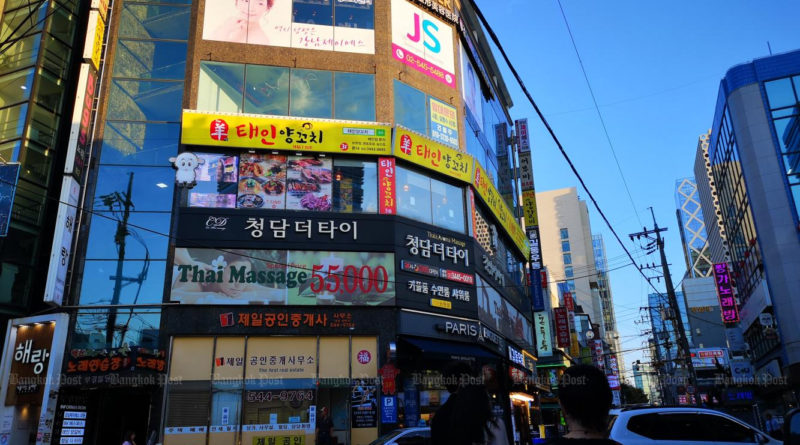SPECIAL REPORT- Plight of ‘little ghosts’ in South Korea South Korea offers high wages but plenty of drawbacks too – Editor’s Pick |Bangkok Post
EDITOR’S PICK
It has been a year since a Thai labour minister met his Korean counterpart to solve the problem of “little ghost” illegal migrant workers in South Korea.
The Bangkok Post recently visited Seoul, Hwaseong and Suwon to get a view on the ground of the scale of the problem and to hear the stories of Thais currently working illegally in the country.
Up to 140,000 illegal workers from Thailand are thought to work in South Korea, or 70% of the estimated 200,000 total illegal migrant workers in the East Asian country.
.
–THIS SPACE BELOW IS RESERVE FOR YOUR ADVERTISEMENT –

Only 25,000 Thai workers are there legally, a mere fraction of the so-called grey market.
From time to time, news reports emerge of illegal Thai workers being arrested committing crimes in Korea. Meanwhile, many Thai tourists have complained they have been rejected or held by Korean immigration on suspicion of attempting to enter the country to work illegally.
Many tour agencies say they are in trouble with local authorities after customers failed to take return flights despite tour guides signing guarantees that they were only visiting Korea for tourism and would not overstay.
.
–THIS SPACE BELOW IS RESERVE FOR YOUR ADVERTISEMENT –

On social media, many users have complained that illegal overseas workers sully the reputation of the country.
Following the meeting between then Labour Minister Adul Sangsingkeo and South Korean Justice Minister Park Sang-gi and Immigration Service Commissioner Cha Gyu-geun, blacklist exemptions were offered to entice illegal workers to return home. From October last year to April, the programme drew about 15,000 Thai returnees.
“The number of illegal workers from Thailand did not increase much this year,” ambassador to South Korea Singtong Lapisatepun said.
“From 2017 to 2018, the number doubled from 60,000 or 70,000 people to 130,000 people,” he said.
.
–THIS SPACE BELOW IS RESERVE FOR YOUR ADVERTISEMENT –

From 2018 to 2019, the number increased from 130,000 to 140,000 workers, he said citing information from the Korean immigration office.
Thai nationals can stay in South Korea for 90 days as tourists without having to apply for visas.
After the success in stopping the influx, the ambassador praised the cooperation between the two countries in tackling the problem.
“If the Koreans do not help, it’s difficult for us. As long as demand for migrant workers remains and the Korean government does not punish employers seriously, we will see a further influx of illegal workers,” he said.
“[Before] people talked only about the good money labourers can make, say 8-9 times [more than the wage in Thailand], but they never mentioned the false advertisements, fraud, labourers being stranded or the ultra-high costs the labourers face if they fall ill with no insurance,” he said.
“Once they fall ill, all the money they have earned is gone,” he said, adding that in many cases, the illegal workers cannot afford their medical bills as they have already sent their wages back home.
.
–THIS SPACE BELOW IS RESERVE FOR YOUR ADVERTISEMENT –

Meanwhile, many Thai women are lured to do massage jobs in which they might be forced to work at any time of the day, he said. “Some of them were forced to provide sex services,” he added.
.
–THIS SPACE BELOW IS RESERVE FOR YOUR ADVERTISEMENT –

Better pay
Besides massage, illegal Thai labourers work at farms, factories and construction sites.
The minimum wage according to Korean law starts at 8,350 won per hour, which means the labourers can earn around 1.7 million won (43,000 baht) per month, plus overtime pay.
In addition, employers usually provide them with meals and accommodation. Illegal workers usually enjoy similar rates of pay to legal workers. What they miss out on, however, are health insurance, savings and reliable promises.
.
–THIS SPACE BELOW IS RESERVE FOR YOUR ADVERTISEMENT –

Unlucky cases
Jakkrawut Moontha, a labour volunteer who would often be contacted in cases of emergencies, said many workers are cheated by their brokers and taxi drivers, many of whom are Thais.
Some abuse the workers physically, or collude with brokers not to pay them. If they stand up for their wages and rights, they can be threatened with violence or repatriation, he said.
A 24-year-old woman in Hwaseong, who asked not to be named, told the Bangkok Post she was cheated by a Thai taxi driver on arrival in Korea. He charged her 200,000 won (about 5,000 baht) for a short ride.
The owner of a Thai restaurant in Hwaseong city said she had heard of many cases of workers being cheated by Thai brokers and taxi drivers.
Although she would advise the workers to take photos of the taxis and file complaints to police, they rarely would for fear of being caught, she said.
“Without the victims’ complaints, there is nothing others can do to help,” she said.
Ambassador Singtong said in many cases the embassy would not be contacted by labourers even when they faced emergencies. They might be sent to the hospital but, due to Korean data protection laws, they remained off the embassy’s radar.
.
–THIS SPACE BELOW IS RESERVE FOR YOUR ADVERTISEMENT –

The lucky ones
One 24-year-old woman said that one time, when she needed an operation, her employer paid all 4 million won (101,000 baht) in costs, she said.
However, she said Koreans tend to let workers carry on unless they are seriously ill.
The woman from Maha Sarakham came with her 29-year-old husband from Amnat Charoen. Both work at a small factory in Hwaseong and identify themselves among the lucky ones.
They were recommended for the jobs by a friend who worked there before and had returned to Thailand.
Once working, they were approached by a broker who told them he could secure them a work permit for 1.5 million won each. “My friend told me to ignore them as that cannot be true,” she said.
At the family-run factory, the couple works six days a week and earn 1.8 million won (about 46,000 baht) a month each.
They are provided with meals and accommodation where they are responsible for only the cost of the electricity and gas they mainly use in winter.
After two years with the same employer, she said the only problems are delayed payment and a lack of work at times. “Sometimes there is no work to do, so we go and work at fruit orchards for a few months before coming back,” she said.
A 32-year-old masseuse told the Bangkok Post in Seoul that she had been working for two months and had sent 50,000 baht back home.
She said her employer gives her meals and accommodation while she also receives some tips from customers. The employer also protects her, and four other Thai colleagues, from the customers who ask for sex services, she said.
In Thailand, she worked as a masseuse in Samui, where she earned over 30,000 baht a month, but the cost of living was higher. So far, she has no problem with her work other than that sometimes she has to work late, finishing around 4am, but still be ready for duty when the shop opens at 11am.
.
–THIS SPACE BELOW IS RESERVE FOR YOUR ADVERTISEMENT –

 Comfort food: A Thai restaurant in Hwaseong city is popular among workers from Thailand. The restaurant plays Luk Thung songs and displays photos of members of the Chakri Dynasty on its walls.
Comfort food: A Thai restaurant in Hwaseong city is popular among workers from Thailand. The restaurant plays Luk Thung songs and displays photos of members of the Chakri Dynasty on its walls.
.
The woman, who is originally from Si Sa Ket, plans to come back to Thailand before her 90-day visa-free permit ends. She plans to come back to find a job again, possibly with the same employer. Interestingly, she did not realise that working while on a visa exemption is illegal.
.
–THIS SPACE BELOW IS RESERVE FOR YOUR ADVERTISEMENT –

Tour tickets and risks
The 32-year-old masseuse said she did not have any problem passing immigration screening after buying return air tickets for 7,000 baht and posing as a tourist. However, she had been in contact with the friend who recommended her for the job and was picked up at the airport by that person.
.
–THIS SPACE BELOW IS RESERVE FOR YOUR ADVERTISEMENT –

Debts as motivation
The 24-year-old woman who came with her husband said she had been prepared to take the risks involved with working illegally as she wanted to pay off her grandmother’s debts to the Bank of Agriculture and Agricultural Cooperatives.
Meanwhile, her husband owed money to the Student Loan Fund and to his credit card issuers. Their debts totalled hundreds of thousands of baht, but less than a million, she said, adding that at present there is still a little over a hundred thousand baht to repay.
Her husband said they sent back 2.5 million won (64,000 baht) back to Thailand each month. The couple plan to return to Thailand early next year, after they repay all the debts, the woman said.
“My advice to others is to try to work through the [Thai] Department of Employment. Then, if there are any problems, we have rights. My husband and I barely win as we are little ghosts,” she said. “It’s worth the wait, really. But sometimes people in debt cannot wait,” she said.
A 33-year-old woman working at a pig farm in Pyeongtaek city said she had 800,000 baht debt five years ago. Now, although she has no savings, she is debt-free. “Is life as a little ghost difficult? Now it’s not as I’m used to it. But my first year was horribly difficult. Only the money made me survive,” she said.
She had 40,000 baht with her when she landed in Korea and jumped the tour group she was with despite knowing no one in the country.
A local broker took 500,000-600,000 won per job recommendation. However, many times the work did not match the description. She worked at a boat building shop where the job proved too strenuous, a vegetable farm where she was harassed by the employer and a bag factory where the employer fired her after three months without paying her. She lost all the money at that time. “I was stranded, didn’t know where to go. I was in tears and posted on Facebook looking for help. It worked, four or five Thai people living nearby came to help. They were like angels to me at the time,” she said.
Unfortunately, her worst experience also involved a Thai living in the country who lured her to his apartment saying he would find her a job but later tried to rape her. She escaped when the man’s wife returned home before the assault could occur. Having worked at the farm for three years, she now earns 2.3 million won a month and is responsible for every step of the pigs’ care until they are sold. She has no immediate plans to return to Thailand but does not plan to stay in Korea forever, either.
.
–THIS SPACE BELOW IS RESERVE FOR YOUR ADVERTISEMENT –

Safety nets
Lee Mi-hee, a missionary working at the Thai Pocheon Church in Pocheon city, said that besides helping workers negotiate and solve conflicts with employers, she tries to encourage workers to apply for the medical card, provided by the Migrant Health Association in Korea and the Medical Mutual-Aid Union for Migrant Workers in Korea.
For 10,000 won (250 baht) a month, the card entitles the bearer to a 30% discount on medical bills.
In return, she asks the 60 Thai workers she takes care of to come to the church and study the Bible every week.
Wat Buddharangsee Seoul is another place Thai workers come to when they need help or want to be part of a Thai community on religious and important occasions.
Phra Phichai Chinnakamo, the abbot, said his temple also provides sanctuary to workers waiting to be employed. Personally, he sees no need to crack down on illegal workers. According to Phra Phichai, Korean employers need labourers to work dirty, dangerous and difficult jobs on lower wages. Meanwhile, Thai labourers are happy to oblige as they will still earn more than they could back home.
Ambassador Singtong said the Thai community and the embassy are also there to help Thai workers.
In a recent case, a Thai worker owed a hospital for 200 million won (5 million baht), and the Thai community manage to raise 11 million won. The embassy negotiated and the hospital reluctantly accepted that amount to clear the debt.
.
–THIS SPACE BELOW IS RESERVE FOR YOUR ADVERTISEMENT –

A long-term solution
Ambassador Singtong said there have been talks about easing the criteria and increasing the quotas for Thais under the Employment Permit System.
Lee Jaeh-yung, a consul at the South Korea embassy in Bangkok, said the Korean government regards the large recent increase (prior to this year) of Thai illegal workers as a critical issue. “The Korean government has been putting a large effort into enforcing the Immigration Act against employers who hire illegal foreign workers,” he said.
Korea has been taking strong measures such as thorough immigration checks at ports of entry and workplaces as well as increasing the punishments available to hand out to the illegal workers and their employers, he said.
Under the Korean Immigration Act, an employer of illegal workers can be punished by imprisonment with labour for up to three years or by a fine of up to 20 million won (509,000 baht). The government is planning to raise the potential prison sentence to five years and the fine to 50 million won (1.2 million baht), he added.
“As preventive measures, now we are focusing on preventing Thais from working illegally, which includes tough screening of Thais suspected of intending to work illegally at the airport and cracking down on the illegal employment brokers,” he said. “We hope the two countries could solve these illegal migrant issues on the basis of strong trust in each other,” he said.
This report is part of the Korea Press Foundation’s Korea-Asean Joint News Coverage Programme. The ‘Bangkok Post’ worked independently, in collaboration with ‘Hankook Ilbo’, to produce this report.
.
–THIS SPACE BELOW IS RESERVE FOR YOUR ADVERTISEMENT –

THE EDITOR
 All photographs, news, editorials, opinions, information, data, others have been taken from the Internet
All photographs, news, editorials, opinions, information, data, others have been taken from the Internet
For comments, Email to :D’Equalizer | [email protected] | THE EDITOR









